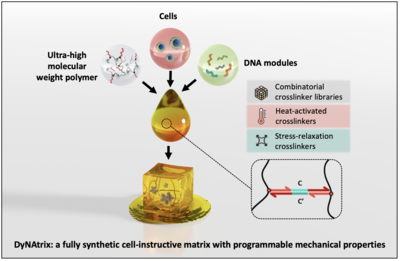News
Programmierbare DNA-Hydrogele für fortschrittliche Zellkulturen und personalisierte Medizin

Die In-vitro-Kultur von biologischen Zellen ist für die biologische Forschung von großer Bedeutung. Die derzeit verfügbaren Zellkulturmaterialien haben jedoch erhebliche Nachteile. Viele von ihnen stammen aus tierischen Quellen, sind schlecht reproduzierbar und ihre mechanischen Eigenschaften lassen sich nur schwer bestimmen. Daher besteht ein dringender Bedarf, neue Ansätze zur Herstellung weicher und biokompatibler Materialien mit vorhersagbaren Eigenschaften zu erforschen.
Das Team um Dr. Elisha Krieg am Leibniz-Institut für Polymerforschung Dresden hat eine dynamische DNA-vernetzte Matrix (DyNAtrix) entwickelt, indem es klassische synthetische Polymere mit programmierbaren DNA-Vernetzern kombiniert. Die hochspezifische und vorhersagbare Bindung der DNA verleiht den Materialien eine unvergleichliche Kontrolle über wichtige mechanische Eigenschaften. In ihrer am 7. August in Nature Nanotechnology veröffentlichten Arbeit berichten sie, dass DyNAtrix eine systematische Kontrolle über seine viskoelastischen, thermodynamischen und kinetischen Eigenschaften ermöglicht, indem die DNA-Sequenzinformationen verändert werden. Die vorhersagbare Stabilität der DNA-Vernetzungen ermöglicht eine kontrollierte Anpassung der Spannungs-Relaxations-Eigenschaften, die die Eigenschaften von lebendem Gewebe nachahmen. DyNAtrix ist selbstheilend und für den 3D Druck geeignet. Darüber hinaus zeichnet es sich durch eine hohe Stabilität aus, wobei es mithilfe von Enzymen auch kontrolliert wieder abgebaut werden kann. Zellkulturen mit menschlichen mesenchymalen Stromazellen, pluripotenten Stammzellen, Nierenzysten von Hunden und menschlichen Trophoblastenorganoiden belegen die hohe Biokompatibilität des Materials.
Die programmierbaren Eigenschaften von DyNAtrix lassen auf ein vielversprechendes Potenzial für neue Anwendungen in der Gewebekultur schließen. Die laufenden Studien konzentrieren sich auf die Auswirkungen der viskoelastischen Eigenschaften auf die Entwicklung von Zellen und Organoiden. In Zukunft kann DyNAtrix in der Grundlagenforschung und der personalisierten Medizin eingesetzt werden, zum Beispiel, um von Patienten stammende Gewebemodelle im Labor zu reproduzieren und zu untersuchen.
---------------ENGLISH-----------------------------------------------------------------------------------------------------
Programmable DNA hydrogels for advanced cell culture and personalized medicine
In-vitro culture of biological cells plays an important role in advancing biological research. However, currently available cell culture materials have significant drawbacks. Many of them are derived from animal sources, leading to poor reproducibility, and making it difficult to fine-tune their mechanical properties. Therefore, there is an urgent need for new approaches to create soft and biocompatible materials with predictable properties.
The team of Dr. Elisha Krieg at the Leibniz Institute of Polymer Research Dresden has developed a dynamic DNA-crosslinked matrix (DyNAtrix) by combining classical synthetic polymers with programmable DNA crosslinkers. DNA’s highly specific and predictable binding gives researchers unparalleled control over key mechanical properties of the material. Published in Nature Nanotechnology on August 7, their research shows how DyNAtrix enables systematic control over its viscoelastic, thermodynamic, and kinetic characteristics by simply changing the DNA sequence information. The predictable stability of DNA crosslinks allows the stress-relaxation properties to be rationally tuned, mimicking the characteristics of living tissues. DyNAtrix is self-healing, printable, and exhibits high stability and controllable degradation. Cell culture with human mesenchymal stromal cells, pluripotent stem cells, canine kidney cysts, and human trophoblast organoids demonstrate the high biocompatibility of the materials.
The programmable properties of the material point to promising potential for new applications in tissue culture. The ongoing studies focus on the effect of viscoelastic properties on cell and organoid development. In the future, DyNAtrix can be used in basic research and personalized medicine, for example, to reproduce and investigate patient-derived tissue models in the laboratory.
Publication URL: https://www.nature.com/articles/s41565-023-01483-3
08.08.2023

